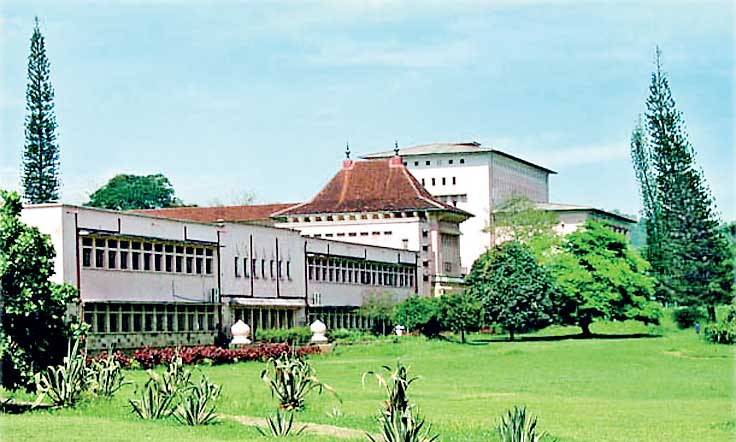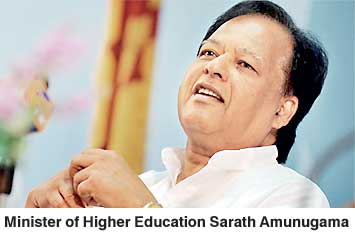Sunday Feb 22, 2026
Sunday Feb 22, 2026
Wednesday, 10 June 2015 00:00 - - {{hitsCtrl.values.hits}}

The University of Peradeniya, where Sarath Amunugama was an alumnus at a time when universities were free of the kind of political influence that began to afflict them in later years
Speaking at the first meeting of the Committee of Vice Chancellors and Directors (CVCD) held in Kankasanthurai at the tail-end of last month, the current Minister of Higher Education Sarath Amunugama made some telling observations which unfortunately escaped the attention of the supposedly eagle-eyed gatekeepers in some of the local media. So they did not receive the attention that Amunugama’s remarks surely deserved.
Perhaps it is because our mainstream media, probably influenced by growing pressure from the kind of news that now percolates in social media, are so obsessed with politics and political gossip that other issues are ignored or are relegated as not important enough to be given some space in the print or time in the electronic media.
It is curious how even important issues concerning our universities in a country that places a premium on education do not seem to arouse the interest of today’s journalists. If there is a student protest at any of the universities it would make the front pages of the newspapers and extended visual coverage on TV.
But when matters concerning academic freedom, the freeing of university education from political influence and infiltration and the administration of our tertiary institutions are mentioned, a lackadaisical media fails to pick the whiff of a significant change in the political attitude towards the universities that are hinted at by the minister concerned.

Gobbledegook from Ministry of Higher Education
The Ministry of Higher Education’s own website has not helped in conveying Minister Amunugama’s message. A report of that KKS meeting carried in the website makes nonsense of what the Minister would have said. Here is a sample of what appears in the website:
“We can address the current issues and problems what we are having now in the sphere of education by sitting one table. Today Sri Lankan universities are entirely in new phenomenon with the modernising world and that should be taken in to consideration of ours.”
Further on it says: “No need of political interference at all as I believe in connection with university education…. As a graduate or teacher I can visit to the universities, but not as a politician because the universities must be independent.”
This gobbledegook coming from the Ministry of Higher Education does no justice to its Minister who is surely one of the most intelligent and knowledgeable persons in the current Cabinet. It would seem that Minister Amunugama while tackling the problems of higher education will have to provide elementary education to some of those at the Ministry.
In passing let me say that this website report refers to a meeting of the CVCD but fails to mention what the abbreviation stands for.
Is it scant wonder that the more competent of journalists in our media world avoid reading the websites of various ministries and State institutions because quite often trying to make sense out of what is written is like trying to decipher some intricate war-time code.
Independence of universities
Meanwhile it is difficult to say whether the steps already taken to free universities of political interference and provide some degree of autonomy as Minister Amunugama has indicated, would continue or is only a temporary phenomenon given the political uncertainties that prevail in the country today.
Minister Amunugama made an extremely valid point when he told the vice chancellors and directors that universities should be independent and free to make their own decisions to deal with the problems of tertiary education.
He emphasised that political interference in universities “cannot be justified on any grounds.”
Sarath Amunugama was an alumnus of the University of Peradeniya at a time when universities were free of the kind of political influence that began to afflict them in later years. If I remember correctly he was at Peradeniya from 1957 to 1961 and these were among the best years to be an undergraduate at Peradeniya University which had built a healthy reputation not only as a great seat of learning but as the country’s first residential university providing a wonderful cultural experience. It was a cultural oasis which unfortunately seemed heading for desertification in later years.
Attempts to tame the country’s universities
If my memory serves me correct, the first attempts to tame the country’s universities began when academics and administrators started asserting the autonomy of their institutions and standing up to efforts by the Education Ministry to curb that freedom.
I.M.R.A. Iriyagolle was Education Minister during the 1965-’70 Government of Prime Minister Dudley Senanayake. He perceived the universities to be too independent and a law unto themselves. To him the word “autonomy” came from a lexicon of unmentionables. I well remember his deriding references to “autonomiya” as he called it, in his Parliamentary speeches decrying the combined efforts of academia against the inroads of the education bureaucracy trying to bring the universities to heel. Minister Iriyagolle was an excellent Sinhala speaker and his cutting edge remarks could be devastating.
Perhaps this was the beginning of political interference in tertiary education. A more detailed study of the subject should reveal when the rot set in and how it spread with successive administrations and education ministers some of whom wanted to exercise power over institutions which they had never entered or disliked those with educational qualifications which they could never hope to obtain.
The right of student protest
While the ramifications of political interference in the universities were implicit in Minister Amunugama’s remarks, there was another important issue which he placed before the heads of our universities.
“I do believe that students can protest since they have a right to do so, but as long as they are not breaking the law.”
The right of student protest within the ambit of the law was thus clearly underlined. Minister Amunugama obviously remembers that during his undergraduate days at Peradeniya there were many protests and strikes. During his time as President of the University Students Union, we did indeed go on strike and hold protest marches against what we felt at the time were injustices.
Later as a journalist at Lake House and a former Peradeniya alumnus I would often be assigned to go to the campus and cover various protests and clashes mostly with the Police and occasionally with Army troops marching through the campus which was considered holy territory that should not be desecrated with boots on the ground.
In Jaffna where there had been university student protests some days earlier, Minister Amunugama set down two vital principles – non-interference in university academic and administration affairs and the right of student protest within the law.
These are principles that should be set in stone. But today’s stones do not always survive the vicissitudes of modern political pressure though the stone edicts of ancient kings are still visible centuries later.